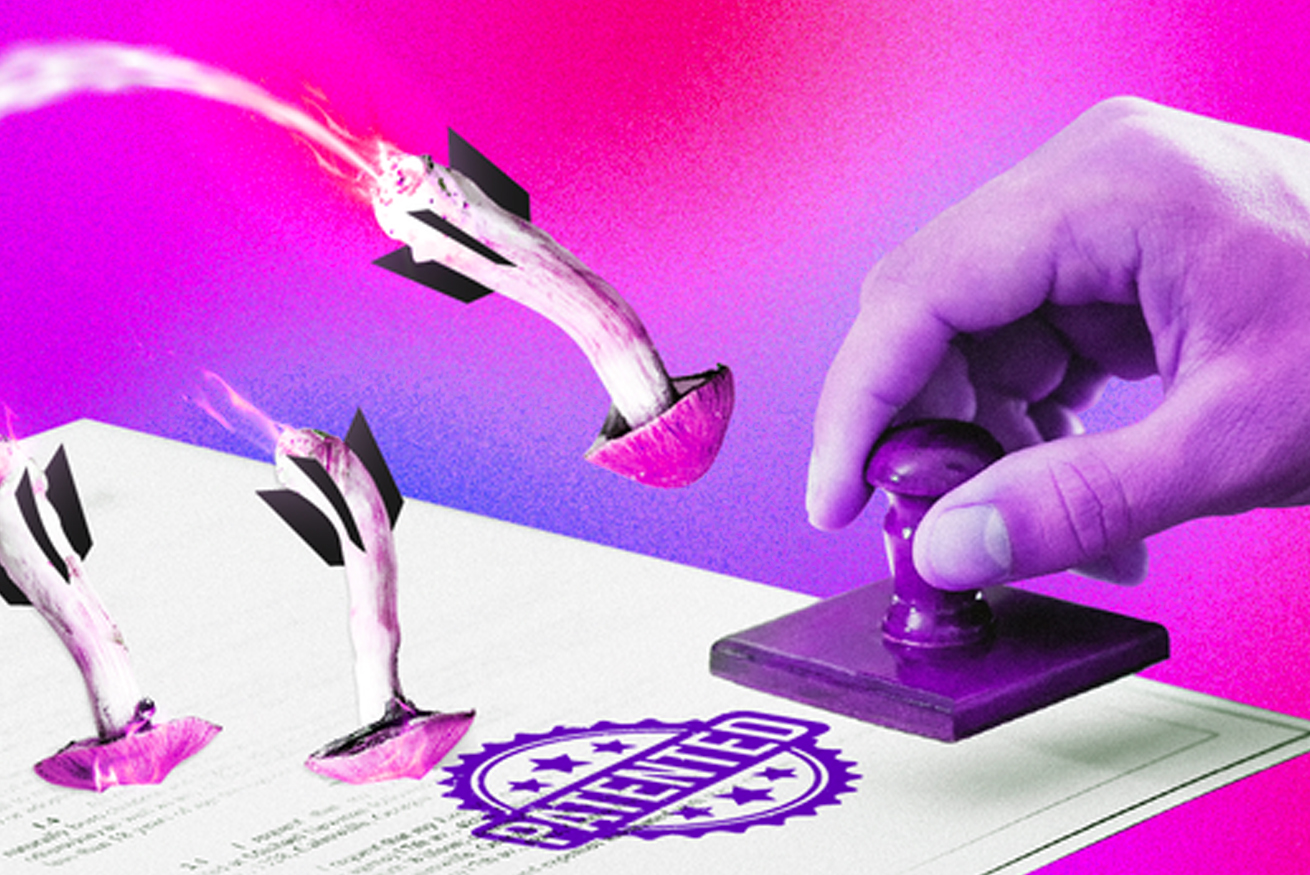
This article was contributed by By Kimberly Chew, Edward Gamson and Andrew Landsman of Husch Blackwell
As psychedelic medicine grows out of its infancy, portfolios of issued patents are getting significantly larger, and challenges to those patents are being filed with the United States Patent and Trademark Office (USPTO). The fate of these patents will shape the trajectory of the medicinal psychedelic industry in the near term.
Some patents in this emerging area have been challenged because there are differing opinions on whether psychedelic compounds should be treated like other pharmaceutical drugs. Traditionally, patents and other forms of intellectual property protection play a role in encouraging innovation in biopharmaceuticals by rewarding those willing to undergo the “long, costly, and risky” process of developing a new drug with a right to exclude others —for whom the “costs of imitation are low”— from making the same biopharmaceuticals for a limited period of time.
Perhaps unsurprisingly, however, there are organizations challenging psychedelic-related patents that argue that the patent system actually stifles innovation, advocating instead for an less regulated development process for psychedelics that supports open science, an approach driven in part by a desire to prevent one company from monopolizing the industry. These contrasting strategies illustrate a tension in the emerging psychedelics industry.
Freedom to Operate, Inc., v. Compass Pathfinder PLC
Resolving this tension has landed with the USPTO, and patent disputes like Freedom to Operate, Inc., v. Compass Pathfinder PLC will play a pivotal role in the future of psychedelic medicine. Experimentation and mass production of psychedelics are being led by companies built on very different business models. Compass Pathways PLC, for example, started out as a charity but transitioned to a for-profit company that went public in 2020. On the other hand, companies like Freedom to Operate, Inc., and the Usona Institute are nonprofits that have not filed for patents and openly publish papers showing their manufacturing process, taking an “open science” approach.
Recent controversies involving patents in the psychedelics space have essentially developed around the questions of novelty and whether aspects of the research being patented today should be patentable or not. One such controversy began with Compass Pathways’ patent on its manufacturing process for synthetic psilocybin, called Polymorph A. Although psilocybin naturally exists in certain types of mushrooms, which have been used for centuries by practitioners of tribal medicine, the molecule was synthesized for the first time in 1958. Broadly speaking, those questioning Compass Pathways’ patent believed that its claims are not novel, but rather depend on previously published material. However, a cofounder of Compass Pathways, Dr. Ekaterina Malievskaia, has expressed that “previously published synthesis processes did not scale to meet regulatory standards, we had to invent our own process… solving over 60 distinct technical problems in the synthesis and formulation process.”
Freedom to Operate filed petitions for post-grant review (PGR) of two Compass Pathways’ related patents (No. 10,947,257 and No. 10,954,259) with the USPTO’s Patent Trial and Appeal Board (PTAB) in December 2021, arguing in both petitions that Polymorph A is not new, is “a mixture of other psilocybin crystalline forms that have been made before,” and is therefore unpatentable. Freedom to Operate conducted extensive and expensive research to support its petitions, but the PTAB ruled in favor of Compass Pathways and denied institution of both PGR’s on June 22, 2022.
Compass Pathways has a vested interest in protecting its claims on Polymorph A and has several U.S. patents that include claims to Polymorph A used in its synthetic formulation COMP360. The U.S. Food and Drug Administration awarded “Breakthrough Therapy” designation to Compass Pathways in 2018 for the use of COMP360 therapy for treatment-resistant depression. Its positive Phase IIb results were presented in May 2022. Compass Pathways is also running clinical trials for administration of COMP360 for the treatment of anorexia nervosa.
Its first patent involving Polymorph A indicated the importance of crystallography, including a claim for “crystalline psilocybin in the form Polymorph A characterized by peaks in an XRPD diffractogram at 11.5, 12.0, 14.5, 17.5, and 19.7°2θ ±0.1°2θ.” Back in 2018, its cofounder estimated that the development process of psilocybin as a pharmaceutical would be nearly $4 million. The company has adopted a patent strategy that does not cover “naturally occurring mushrooms . . .[and] would not prevent others from creating different solutions for their own psilocybin synthesis, nor would it restrict others researching in this field.”
Freedom to Operate argued in its PGR petitions that scaling up production led to some inconsistencies in the drying process, leaving some crystals in form Polymorph A Prime and converting others to Polymorph B. The PGR petitions argue that the diffractogram reflects merely this process, not a new crystal form, and that this specific polymorph mixture was already reported in a 1975 publication.
The PTAB found Freedom to Operate’s arguments unconvincing because the measurements reflecting applicable prior art in its petition did not correspond to Compass Pathways’ exact measurements of Polymorph A. The PTAB therefore agreed with Compass Pathways’ arguments and interpretation of their patents and declined to institute the PGRs. Each company has interpreted the decision as a win, with Freedom to Operate saying the decision limits Compass Pathways’ “ownership [to] . . . the exact shape of their form of psilocybin, and not others,” while Compass Pathways does not “see how avoiding infringing on their patents is easier now than before.”
Polymorphs have been patented in the past. For example, certain polymorphs of ritonavir, a drug used to treat HIV, were found to have greater shelf life than others and were patented in the 1990s. Comparable patent challenges have arisen with respect to “candy flipping,” or taking LSD and 3,4-methylenedioxymethamphetamine (MDMA) together, which is a practice that has long existed but was recently granted a patent. We may have not yet seen the last of this battle over Polymorph A. On July 25, 2022, Freedom to Operate announced its filing of a request for reconsideration of the PTAB’s decision not to institute PGR of the Compass Pathway patents. There is no appeal available from a PTAB refusal to initiate a PGR. Researchers and investors should stay tuned.
Conclusion
Evidence of organizations spending tens or hundreds of thousands of dollars on medicinal psychedelic patent disputes should catch the attention of investors. Some projections estimate that the industry will reach a valuation of nearly $7 billion by 2027. Organizations that obtain patents on commercially scaled processes of psilocybin production will likely have the best shot at capturing a significant portion of that $7 billion valuation. In fact, Psilocybin Alpha, a website that tracks psilocybin-related patents, currently identifies 43 applications and another 77 approved patents. The competition for patents is well under way.
Kimberly Chew, Edward Gamson and Andrew Landsman are attorneys with the law firm Husch Blackwell. The authors wish to thank Husch Blackwell summer associates Olga Shupyatskaya, Brenden Buford and Arianne E. Rodriguez, Ph.D. for their contributions to this article





